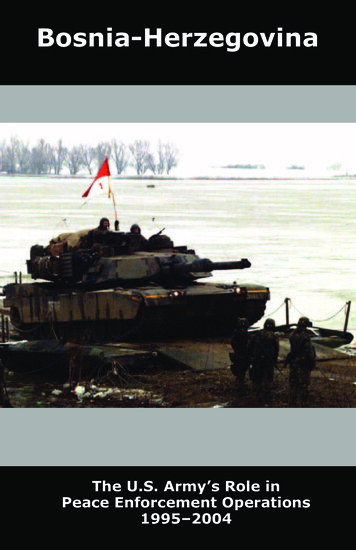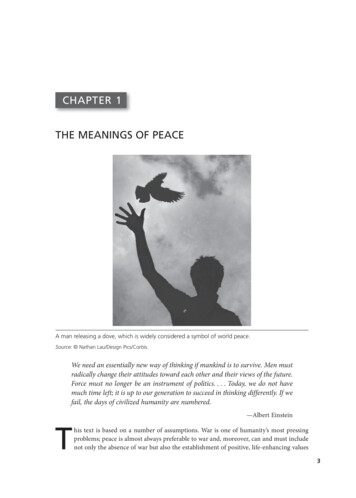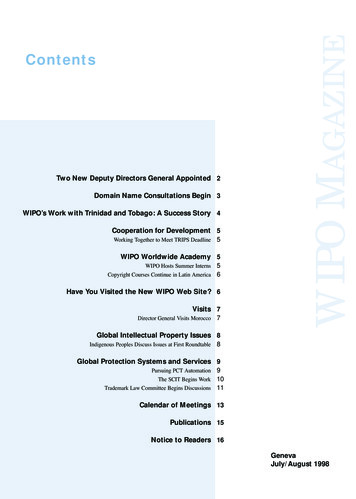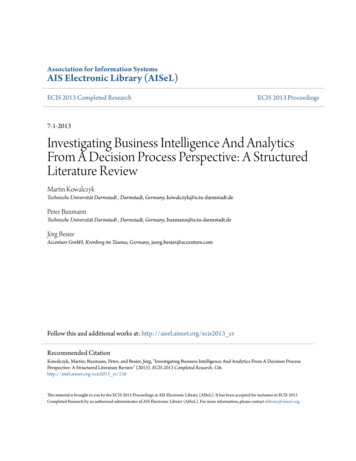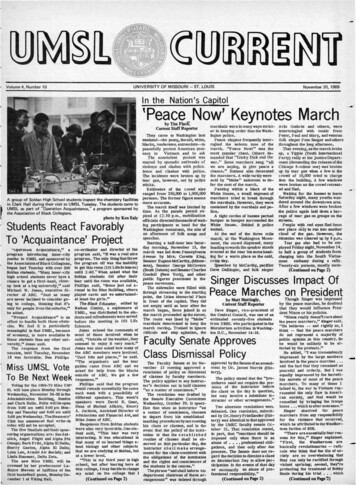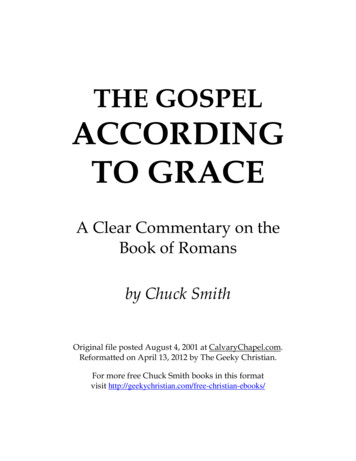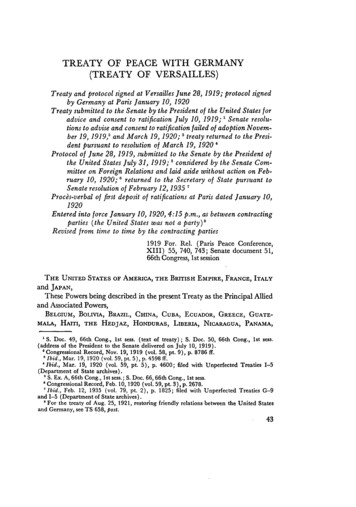
Transcription
TREATY OF PEACE WITH GERMANY(TREATY OF VERSAILLES)Treaty and protocol signed at Versailles June 28, 1919; protocol signedby Germany at Paris January 10, 1920Treaty submitted to the Senate by the President of the United States foradvice and consent to ratification July 10, 1919; 1 Senate resolutions to advise and consent to ratification failed of adoption November 19,1919,2 and March 19, 1920; 3 treaty returned to the President pursuant to resolution of March 19, 1920 4Protocol of June 28, 1919, submitted to the Senate by the President ofthe United States July 31, 1919; 5 considered by the Senate Committee on Foreign Relations and laid aside without action on February 10, 1920; 6 returned to the Secretary of State pursuant toSenate resolution of February 12, 1935 7Proces-verbal of first deposit of ratifications at Paris dated January 10,1920Entered into force January 10,1920,4:15 p.m., as between contractingparties (the United States was not a party) 8Revised from time to time by the contracting parties1919 For. ReI. (Paris Peace Conference,XIII) 55, 740, 743; Senate document 51,66th Congress, 1st sessionTHE UNITED STATES OF AMERICA, THE BRITISH EMPIRE, FRANCE, ITALYand JAPAN,These Powers being described in the present Treaty as the Principal Alliedand Associated Powers,BELGIUM, BOLIVIA, BRAZIL, CHINA, CUBA, ECUADOR, GREECE, GUATEMALA, HAITI, THE HEDJAZ, HONDURAS, LIBERIA, NICARAGUA, PANAMA,1 S. Doc. 49, 66th Cong., 1st sess. (text of treaty); S. Doc. 50, 66th Cong., 1st sess.(address of the President to the Senate delivered on July 10, 1919). Congressional Record, Nov. 19, 1919 (vol. 58, pt. 9), p. 8786 fT. Ibid., Mar. 19,1920 (vol. 59, pt. 5), p. 4598 fr.'Ibid., Mar. 19, 1920 (vol. 59, pt. 5), p. 4600; filed with Unperfected Treaties 1-5(Department of State archives).G S. Ex. A, 66th Cong., 1st sess.; S. Doc. 66, 66th Cong., 1st sess.e Congressional Record, Feb. 10, 1920 (vol. 59, pt. 3), p. 2678.7 Ibid., Feb. 12, 1935 (vol. 79, pt. 2), p. 1825; filed with Unperfected Treaties G-9and 1-5 (Department of State archives).e For the treaty of Aug. 25, 1921, restoring friendly relations between the United Statesand Gennany, see TS 658, post.43
44MULTILATERAL AGREEMENTS 1918-1930PERU, POLAND, PORTUGAL, ROUMANIA, THE SERB-CROAT-SLOVENE STATE,SIAM, CZECHO-SLOVAKIA, and URUGUAY,These Powers constituting with the Principal Powers mentioned above theAllied and Associated Powers,of the one part;And GERMANY,of the other part;Bearing in mind that on the request of the Imperial German Governmentan Armistice was granted on November 11, 1918,9 to Germany by the Principal Allied and Associated Powers in order that a Treaty of Peace might beconcluded with her, andThe Allied and Associated Powers being equally desirous that the war inwhich they were successively involved directly or indirectly and which originated in the declaration of war by Austria-Hungary on July 28,1914, againstSerbia, the declaration of war by Germany against Russia on August 1, 1914,and against France on August 3,1914, and in the invasion of Belgium, shouldbe replaced by a firm, just and durable Peace,For this purpose the HIGH CONTRACTING PARTIES represented as follows:THE PRESIDENT OF THE UNITED STATES OF AMERICA, by:The Honourable Woodrow WILSON, PRESIDENT OF THE UNITED STATES,acting in his own name and by his own proper authority;The Honourable Robert LANSING, Secretary of State;The Honourable Henry WHITE, formerly Ambassador Extraordinary andPlenipotentiary of the United States at Rome and Paris;The Honourable Edward M. HOUSE;General Tasker H. BLISS, Military Representative of the United Stateson the Supreme War Council;HIS MAJESTY THE KING OF THE UNITED KINGDOM OF GREAT BRITAIN ANDIRELAND AND OF THE BRITISH DOMINIONS BEYOND THE SEAS, EMPEROR OF INDIA, by:The Right Honourable David LLOYD GEORGE, M.P., First Lord of HisTreasury and Prime Minister;The Right Honourable Andrew BONAR LAW, M.P., His Lord Privy Seal;The Right Honourable Viscount MII,.NER, G.C.B., G.C.M.G., His Secretary of State for the Colonies;The Right Honourable Arthur James BALFOUR, a.M., M.P., His Secretary of State for Foreign Affairs;The Right Honourahle George Nicoll BARNES, M.P., Minister withoutportfolio;And. Ante, p. 9.
TREATY OF VERSAILLES-JUNE 28, 191945for the DOMINION OF CANADA, by:The Honourable Charles Joseph DOHERTY, Minister of Justice;The Honourable Arthur Lewis SIFTON, Minister of Customs;for the COMMONWEALTH OF AUSTRALIA, by:The Right Honourable William Morris HUGHES, Attorney General andPrime Minister;The Right Honourable Sir Joseph COOK, G.C.M.G., Minister for theNavy;for the UNION OF SOUTH AFRICA, by:General the Right Honourable Louis BOTHA, Minister of Native Affairsand Prime Minister;Lieutenant-General the Right Honourable Jan Christian SMUTS, KC.,Minister of Defence;for the DOMINION OF NEW ZEALAND, by:The Right Honourable William Ferguson MASSEY, Minister of Labourand Prime Minister;for INDIA, by:The Right Honourable Edwin Samuel MONTAGU, M. P., His Secretary ofState for India;Major-General His Highness Maharaja Sir Ganga Singh Bahadur, Maharaja of BIKANER, G.C.S.L, G.C.LE., G.c.v.a., KC.B., A.D.C.;THE PRESIDENT OF THE FRENCH REPUBLIC, by:Mr. Georges CLEMENCEAU, President of the Council, Minister of War;Mr. Stephen PICHON, Ministerfor Foreign Affairs;Mr. Louis-Lucien KLOTZ, Minister of Finance;Mr. Andre TARDIEU, Commissary General for Franco-American MilitaryAffairs;Mr. Jules CAMBON, Ambassador of France;HIS MAJESTY THE KING OF ITALY, by:Baron S. SONNINO, Deputy;Marquis G. IMPERIALI, Senator, Ambassador of His Majesty the King ofItaly at London;Mr. S. CRESPI, Deputy;HIS MAJESTY THE EMPEROR OF JAPAN, by:Marquis SAIONZI, formerly President of the Council of Ministers;Baron MAKINO, formerly Minister for Foreign Affairs, Member of theDiplomatic Council;Viscount CHINDA, Ambassador Extraordinary and Plenipotentiary of H.M. the Emperor of Japan at London;Mr. K MATSUI, Ambassador Extraorainary and Plenipotentiary of H. M.the Emperor of Japan at Paris;
46MULTILATERAL AGREEMENTS 1918-1930Mr. H. IJUIN, Ambassador Extraordinary and Plenipotentiary of H. M.the Emperor of Japan at Rome;HIS MAJESTY THE KING OF THE BELGIANS, by:Mr. Paul HYMANS, Minister for Foreign Affairs, Minister of State;Mr. Jules van den HEUVEL, Envoy Extraordinary and Minister Plenipotentiary, Minister of State;Mr. Emile VANDERVELDE, Minister of Justice, Minister of State;THE PRESIDENT OF THE REPUBLIC OF BOLIVIA, by :Mr. Ismael MONTES, Envoy Extraordinary and Minister Plenipotentiaryof Bolivia at Paris;THE PRESIDENT OF THE REPUBLIC OF BRAZIL, by:Mr. Joao Pandia CALOGERAS, Deputy, formerly Minister of Finance;Mr. Raul FERNANDES, Deputy;Mr. Rodrigo Octavio de L. MENEZES, Professor of International Law ofRio de Janeiro;THE PRESIDENT OF THE CHINESE REPUBLIC, by:Mr. Lou Tseng-Tsiang, Minister for Foreign Affairs;Mr. Chengting Thomas WANG, formerly Minister of Agriculture andCommerce;THE PRESIDENT OF THE CUBAN REPUBLIC, by:Mr. Antonio Sanchez de BUSTAMANTE, Dean of the Faculty of Law in theUniversity of Havana, President of the Cuban Society of InternationalLaw;THE PRESIDENT OF THE REPUBLIC OF ECUADOR, by:Mr. Enrique DaRN Y DE ALSUA, Envoy Extraordinary and Minister Plenipotentiary of Ecuador at Paris;HIs MAJESTY THE KING OF THE HELLENES, by:Mr. Eleftherios K. VENISELOS, President of the Council of Ministers;Mr. Nicolas POLITIS, Minister for Foreign Affairs;THE PRESIDENT OF THE REPUBLIC OF GUATEMALA, by:Mr. Joaquin MENDEZ, formerly Minister of State for Public Works andPublic Instruction, Envoy Extraordinary and Minister Plenipotentiaryof Guatemala at Washington, Envoy Extraordinary and Minister Plenipotentiary on special mission at Paris;THE PRESIDENT OF THE REPUBLIC OF HAITI, by:Mr. Tertullien GUILBAUD, Envoy Extraordinary and Minister Plenipotentiary of Haiti at Paris;HIS MAJESTY THE KING OF THE HEDJAZ, by:Mr. Rustem HAioAR;Mr. Abdul Hadi AOUNI;
TREATY OF VERSAILLES-JUNE 28, 191947THE PRESIDENT OF THE REPUBLIC OF HONDURAS, by:Dr. Policarpo BONILLA, on special mission to Washington, formerly President of the Republic of Honduras, Envoy Extraordinary and MinisterPlenipotentiary ;THE PRESIDENT OF THE REPUBLIC OF LIBERIA, by:The Honourable Charles Dunbar Burgess KING, Secretary of State;THE PRESIDENT OF THE REPUBLIC OF NICARAGUA, by:Mr. Salvador CHAMORRO, President of the Chamber of Deputies;THE PRESIDENT OF THE REPUBLIC OF PANAMA, by:Mr. Antonio BURGOS, Envoy Extraordinary and Minister Plenipotentiaryof Panama at Madrid;THE PRESIDENT OF THE REPUBLIC OF PERU, by :Mr. Carlos G. CANDAMO, Envoy Extraordinary and Minister Plenipotentiary of Peru at Paris;THE PRESIDENT OF THE POLISH REPUBLIC, by:Mr. Ignace J. PADEREWSKI, President of the Council of Ministers, Ministerfor Foreign Affairs;Mr. Roman DMOWSKI, President of the Polish National Committee;THE PRESIDENT OF THE PORTUGUESE REPUBLIC, by:Dr. Affonso Augusto DA COSTA, formerly President of the Council ofMinisters;Dr. Augusto Luiz Vieira SOARES, formerly Minister for Foreign Affairs;HIS MAJESTY THE KING OF ROUMANIA, by:Mr. Ion I. C. BRATIANO, President of the Council of Ministers, Ministerfor Foreign Affairs;General Constantin COANDA, Corps Commander, A.D.C. to the King,formerly President of the Council of Ministers;HIS MAJESTY THE KING OF THE SERBS, THE CROATS, AND THE SLOVENES,by:Mr. Nicholas P. PACHITCH, formerly President of the Council of Ministers;Mr. Ante TRUMBIC, Minister for Foreign Affairs;Mr. Milenko VESNITCH, Envoy Extraordinary and Minister Plenipotentiary of H. M. the King of the Serbs, the Croats and the Slovenes atParis;HIS MAJESTY THE KING OF SIAM, by:His Highness Prince CHAROON, Envoy Extraordinary and Minister Plenipotentiary of H. M. the King of Siam at Paris;His Serene Highness Prince Traidos PRABANDHU, Under Secretary ofState for Foreign Affairs;
48MULTILATERAL AGREEMENTS 1918-1930THE PRESIDENT OF THE CZECHo-SLOVAK REPUBLIC, by:Mr. Karel KRAMAR, President of the Council of Ministers;.Mr. Eduard BENES, Minister for Foreign Affairs;THE PRESIDENT OF THE REPUBLIC OF URUGUAY, by:Mr. Juan Antonio BUERO, Minister for Foreign Affairs, formerly Ministerof Industry;GERMANY, by:Mr. Hermann MULLER, Minister for Foreign Affairs of the Empire;Dr. BELL, Minister of the Empire;Acting in the name of the German Empire and of each and every component State,WHO having communicated their full powers found in good and due formhave AGREED AS FOLLOWS:From the coming into force of the present Treaty the state of war willterminate. From that moment and subject to the provisions of this Treatyofficial relations with Germany, and with any of the German States, will beresumed by the Allied and Associated Powers.PART ITHE COVENANT OF THE LEAGUE OF NATIONSTHE HIGH CONTRACTING PARTIES,In order to promote international co-operation and to achieve international peace and securityby the acceptance of obligations not to resort to war,by the prescription of open, just and honourable relations between nations,by the firm estal; lishment of the understandings of international law as theactual rule of conduct among Governments, andby the maintenance of justice and a scrupulous respect for all treaty obligations in the dealings of organised peoples with one another,Agree to this Covenant of the League of Nations.ARTICLE 1The original Members of the League of Nations shall be those of theSignatories which are named in the Annex to this Covenant and also suchof those other States named in the Annex as shall accede without reservation to this Covenant. Such accession shall be effected by a Declaration deposited with the Secretariat within two months of the coming into force ofthe Covenant. Norice thereof shall be sent to all other Members of theLeague.
TREATY OF VERSAILLES-JUNE 28, 191949Any fully self-governing State, Dominion or Colony not named in theAnnex may become a Member of the League if its admission is agreed toby two-thirds of the Assembly, provided that it shall give effective guaranteesof its sincere intention to observe its international obligations, and shall acceptsuch regulations as may be prescribed by the League in regard to its military,naval and air forces and armaments.Any Member of the League may, after two years' notice of its intentionso to do, withdraw from the League, provided that all its international obligations and all its obligations under this Covenant shall have been fulfilledat the time of its withdrawal.ARTICLE2The action of the League under this Covenant shall be effected throughthe instrumentality of an Assembly and of a Council, with a permanentSecretariat.ARTICLE 3The Assembly shall consist of Representatives of the Members of theLeague.The Assembly shall meet at stated intervals and from time to time as occasion may require at the Seat of the League or at such other place as may bedecided upon.The Assembly may deal at its meetings with any matter within the sphereof action of the League or affecting the peace of the world.At meetings of the Assembly each Member of the League shall have onevote, and may have not more than three Representatives.ARTICLE4The Council shall consist of Representatives of the Principal Allied andAssociated Powers, together with Representatives of fouf other Members ofthe League. These four Members of the League shall be selected by the Assembly from time to time in its discretion. Until the appointment of the Representatives of the four Members of the League first selected by the Assembly,Representatives of Belgium, Brazil, Spain and Greece shall be members ofthe Council.With the approval of the majority of the Assembly, the Council may nameadditional Members of the League whose Representatives shall always bemembers of the Council; the Council with like approval may increase thenumber of Members of the League to be selected by the Assembly for representation on the Council.The Council shall meet from time to time as occasion may require, and atleast once a year, at the Seat of the League, or at such other place as maybe decided upon.
50MULTILATERAL AGREEMENTS 1918-1930The Council may deal at its meetings with any matter within the sphereof action of the League or affecting the peace of the world.Any Member of the League not represented on the Council shall be invitedto send a Representative to sit as a member at any meeting of the Councilduring the consideration of matters specially affecting the interests of thatMember of the League.At meetings of the Council, each Member of the League represented onthe Council shall have one vote, and may have not more than one Representative.ARTICLE 5Except where otherwise expressly provided in this Covenant or by theterms of the present Treaty, decisions at any meeting of the Assembly or ofthe Council shall require the agreement of all the Members of the Leaguerepresented at the meeting.All matters of procedure at meetings of the Assembly or of the Council,including the appointment of Committees to investigate particular matters,shall be regulated by the Assembly or by the Council and may be decided bya majority of the Members of the League represented at the meeting.The first meeting of the Assembly and the first meeting of the Council shallbe summoned by the President of the United States of America.ARTICLE6The permanent Secretariat shall be established at the Seat of the League.The Secretariat shall comprise a Secretary General and such secretaries andstaff as may be required.The first Secretary General shall be the person named in the Annex; thereafter the Secretary General shall be appointed by the Council with the approval of the majority of the Assembly.The secretaries and staff of the Secretariat shall be appointed by the Secretary General with the approval of the Council.The Secretary General shall act in that capacity at all meetings of theAssembly and of the Council.The expenses of the Secretariat shall be borne by the Members of theLeague in accordance with the apportionment of the expenses of the International Bureau of the Universal Postal Union.ARTICLE7The Seat of the League is established at Geneva.The Council may at any time decide that the Seat of the League shallbe established elsewhere.All positions under or in connection with the League, including the Secretariat, shall be open equally to men and women.
TREATY OF VERSAILLES-JUNE 28, 191951Representatives of the Members of the League and officials of the Leaguewhen engaged on the business of the League shall enjoy diplomatic privilegesand immunities.The buildings and other property occupied by the League or its officialsor by Representatives attending its meetings shall be inviolable.ARTICLE8The Members of the League recognise that the maintenance of peace requires the reduction of national armaments to the lowest point consistent withnational safety and the enforcement by common action of internationalobligations.The Council, taking account of the geographical situation and circumstances of each State, shall formulate plans for such reduction for the consideration and action of the several Governments.Such plans shall be subject to reconsideration and revision at least everyten years.After these plans shall have been adopted by the several Governments,the limits of armaments therein fixed shall not be exceeded without the concurrence of the Council.The Members of the League agree that the manufacture by private enterprise of munitions and implements of war is open to grave objections. TheCouncil shall advise how the evil effects attendant upon such manufacturecan be prevented, due regard being had to the necessities of those Membersof the League which are not able to manufacture the munitions and implements of war necessary for their safety.The Members of the League undertake to interchange full and frankinformation as to the scale of their armaments, their military, naval and airprogrammes and the condition of such of their industries as are adaptable towar-like purposes.ARTICLE9A permanent Commission shall be constituted to advise the Council on theexecution of the provisions of Articles 1 and 8 and on military, naval and airquestions generally.ARTICLE 10The Members of the League undertake to respect and preserve as againstexternal aggression the territorial integrity and existing political independenceof all Members of the League. In case of any such aggression or in case ofany threat or danger of such aggression the Council shall advise upon themeans by which this obligation shall be fulfilled.ARTICLE11Any war or threat of war, whether immediately affecting any of the Members of the League or not, is hereby declared a matter of concern to the whole
52MULTILATERAL AGREEMENTS 1918-1930League, and the League shall take any action that may be deemed wise andeffectual to safeguard the peace of nations. In case any such emergencyshould arise the Secretary General shall on the request of any Member of theLeague forthwith summon a meeting of the Council.It is also declared to be the friendly right of each Member of the Leagueto bring to the attention of the Assembly or of the Council any circumstancewhatever affecting international relations which threatens to disturb international peace or the good understanding between nations upon which peacedepends.ARTICLE 12The Members of the League agree that if there should arise between themany dispute likely to lead to a rupture, they will submit the matter either toarbitration or to inquiry by the Council, and they agree in no case to resortto war until three months after the award by the arbitrators or the report bythe Council.In any case under this Article the award of the arbitrators shall be madewithin a reasonable time, and the report of the Council shall be made withinsix months after the submission of the dispute.ARTICLE13The Members of the League agree that whenever any dispute shall arisebetween them which they recognise to be suitable for submission to arbitrationand which cannot be satisfactorily settled by diplomacy, they will submit thewhole subject-matter to arbitration.Disputes as to the interpretation of a treaty, as to any question of internationallaw, as to the existence of any fact which if established would constitute a breach of any international obligation, or as to the extent and natureof the reparation to be made for any such breach, are declared to be amongthose which are generally suitable for submission to arbitration.For the consideration of any such dispute the court of arbitration to whichthe case is referred shall be the Court agreed on by the parties to the disputeor stipulated in any convention existing between them.The Members of the League agree that they will carry out in full goodfaith any award that may be rendered, and that they will not resort to waragainst a Member of the League which complies therewith. In the event ofany failure to carry out such an award, the Council shall propose what stepsshould be taken to give effect thereto.ARTICLE14The Council shall formulate and submit to the Members of the League foradoption plans for the establishment of a Permanent Court of InternationalJustice. The Court shall be competent to hear and determine any dispute ofan international character which the parties thereto submit to it. The Court
TREATY OF VERSAILLES-JUNE 28, 191953may also give an advisory opinion upon any dispute or question referred. toit by the Council or by the Assembly.ARTICLE15If there should arise between Members of the League any dispute likely tolead to a rupture, which is not submitted to arbitration in accordance withArticle 13, the Members of the League agree that they will submit the matterto the Council. Any party to the dispute may effect such submission by giving notice of the existence of the dispute to the Secretary General, who willmake all necessary arrangements for a full investigation and considerationthereof.For this purpose the parties to the dispute will communicate to the Secretary General, as promptly as possible, statements of their case with all therelevant facts and papers, and the Council may forthwith direct the publication thereof.The Council shall endeavour to effect a settlement of the dispute, and ifsuch efforts are successful, a statement shall be made public giving such factsand explanations regarding the dispute and the terms of settlement thereofas the Council may deem appropriate.If the dispute is not thus settled, the Council either unanimously or by amajority vote shall make and publish a report containing a statement of thefacts of the dispute and the recommendations which are deemed just andproper in regard thereto. .Any Member of the League represented on the Council may make publica statement of the facts of the dispute and of its conclusions regarding thesame.If a report by the Council is unanimously agreed to by the members thereofother than the Representatives of one or more of the parties to the dispute,the Members of the League agree that they will not go to war with any partyto the dispute which complies with the recommendations of the report.If the Council fails to reach a report which is unanimously agreed to by themembers thereof, other than the Representatives of one or more of the partiesto the dispute, the Members of the League reserve to themselves the right totak such action as they shall consider necessary for the maintenance of rightand justice.If the dispute between the parties is claimed by one of them, and is foundby the Council, to arise out of a matter which by international law is solelywithin the domestic jurisdiction of that party, the Council shall so report, andshall make no recommendation as to its settlement.The Council may in any case under this Article refer the dispute to the Assembly. The dispute shall be so referred at the request of either party to thedispute, provided that such request be made within fourteen days after thesubmission of the dispute to the Council.
54MULTILATERAL AGREEMENTS 1918-1930In any case referred to the Assembly, all the provisions of this Article andof Article 12 relating to the action and powers of the Council shall applyto the action and powers of the Assembly, provided that a report made bythe Assembly, if concurred in by the Representatives of those Members of theLeague represented on the Council and of a majority of the other Membersof the League, exclusive in each case of the Representatives of the parties tothe dispute, shall have the same force as a report by the Council concurred inby all the members thereof other than the Representatives of one or more ofthe parties to the dispute.ARTICLE 16Should any Member of the League resort to war in disregard of its covenants under Articles 12, 13 or 15, it shall ipso facto be deemed to have committed an act of war against all other Members of the League, which herebyundertake immediately to subject it to the severance of all trade or financialrelations, the prohibition of all intercourse between their nationals and thenationals of the covenant-breaking State, and the prevention of all financial,commercial or personal intercourse between the nationals of the covenantbreaking State and the nationals of any other State, whether a Member ofthe League or not.It shall be the duty of the Council in such case to recommend to the several Governments concerned what effective military, naval or air force theMembers of the League shall severally contribute to the armed forces to beused to protect the covenants of the League.The Members of the League agree, further, that they will mutually support one another in the financial and economic measures which are takenunder this Article, in order to minimise the loss and inconvenience resultingfrom the above measures, and that they will mutually support one anotherin resisting any special measures aimed at one of their number by the covenant-breaking State, and that they will take the necessary steps to affordpassage through their territory to the forces of any of the Members of theLeague which are co-operating to protect the covenants of the League.Any Member of the League which has violated any covenant of theLeague may be declared to be no longer a Member of the League by a v teof the Council concurred in by the Representatives of all the other Membersof the League represented thereon.ARTICLE17In the event of a dispute between a Member of the League and a Statewhich is not a Member of the League, or between States not Members of theLeague, the State or States not Members of the League shall be invited toaccept the obligations of membership in the League for the purposes of suchdispute, upon such conditions as the Council may deem just. If such invita-
TREATY OF VERSAILLES-JUNE 28, 191955tion is accepted, the provisions of Articles 12 to 16 inclusive shall be appliedwith such modifications as may be deemed necessary by the Council.Upon such invitation being given the Council shall immediately institutean inquiry into the circumstances of the dispute and recommend such actionas may seem best and most effectual in the circumstances.If a State so invited shall refuse to accept the obligations of membershipin the League for the purposes of such dispute, and shall resort to waragainst a Member of the League, the provisions of Article 16 shall be applicable as against the State taking such action.If both parties to the dispute when so invited refuse to accept the obligations of membership in the League for the purposes of such dispute, theCouncil may take such measures and make such recommendations as willprevent hostilities and will result in the settlement of the dispute.ARTICLE18Every treaty or international engagement entered into hereafter by anyMember of the League shall be forthwith registered with the Secretariat andshall as soon as possible be published by it. No such treaty or internationalengagement shall be binding until so registered.ARTICLE19The Assembly may from time to time advise the reconsideration by Members of the League of treaties which have become inapplicable and the con- .sideration of international conditions whose continuance might endanger thepeace of the world.ARTICLE20The Members of the League severally agree that this Covenant is acceptedas abrogating all obligations or understandings inter se which are inconsistentwith the terms thereof, and solemnly undertake that they will not hereafterenter into any engagements inconsistent with the terms thereof.In case any Member of the League shall, before becoming a Member ofthe League, have undertaken any obligations inconsistent with the termsof this Covenant, it shall be the duty of such Member to take immediate stepsto procure its release from such obligations.ARTICLE21Nothing in this Covenant shall be deemed to affect the validity of international engagements, such as treaties of arbitration or regional understandings like the Monroe doctrine, for securing the maintenance of pea,ce.ARTICLE22To those colonies and territories which as a consequence of the late warhave ceased to be under the sovereignty of the States which formerly governed
56MULTILATERAL AGREEMENTS 1918-1930them and which are inhabited by peoples not yet able to stand by themselvesunder the strenuous conditions of the modem world, there should be appliedthe principle that the well-being and development of such peoples form asacred trust of civilisation and that securities for the performance of this trustshould be embodied in this Covenant.The best method of giving practical effect to this principle is that thetutelage of such peoples should be entrusted to advanced nations who byreason of their resources, their experience or their geographical position canbest undertake this responsibility, and who are willing to accept it, and thatthis tutelage should be exercised by them as Mandatories on behalf of theLeague.The character of the mandate must differ according to the stage of thedevelopment of the people, the geographical situation of the territor
WHO having communicated their full powers found in good and due form have AGREED AS FOLLOWS: From the coming into force of the present Treaty the state of war will terminate. From that moment and subject to the provisions of this Treaty official relations
